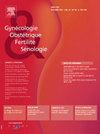Parcours professionnel des gynécologues-obstétricien(ne)s après leur internat
IF 0.6
4区 医学
Q4 OBSTETRICS & GYNECOLOGY
引用次数: 0
Abstract
Objectives
To analyze the career paths of gynecologists-obstetricians to identify the factors that lead them to stop practicing obstetrics or on-call duties.
Material and methods
A questionnaire was sent to 162 gynecologists-obstetricians who began their residency in the Hauts-de-France region between 2003 and 2014. The questions covered their personal life and professional background.
Results
The respondents were predominantly women (83%) with a median age of 37 years. The respondents mostly worked in the public sector (64%), full-time (77%), and practiced obstetrics (80%). Participation in obstetric activities significantly decreases over time (P < 0.001): 95% practiced it in their first position, 43% did so in their fourth position. Eighty percent still participated in on-call duties, but 40% were considering stopping (almost half of them within the next 5 years). Significant factors associated with stopping obstetrics included older age, being male, and practicing surgery. The cessation of on-call duties was significantly associated with age, number of children, involvement in assisted reproductive technology, medical gynecology, or private practice.
Conclusion
The obstetricians and gynecologists in this study still predominantly practice obstetrics and participate in on-call duties after a median of 7 years in practice. However, both activities decrease over time, which is a challenge for medical demographics and represents a major risk to the sustainability of obstetrics services.
[妇产科医生的职业轨迹]。
目的:分析妇产科医生的职业发展道路,找出导致他们停止从事产科或随叫随到工作的因素。材料和方法:向2003年至2014年在上法兰西大区开始住院的162名妇产科医生发送调查问卷。这些问题涵盖了他们的个人生活和职业背景。结果:受访者以女性为主(83%),中位年龄为37岁。受访者大多在公共部门(64%)、全职(77%)和产科执业(80%)工作。随着时间的推移,参与产科活动的人数显著减少(p < 0.001): 95%的人在第一个体位时进行了产科活动,43%的人在第四个体位时进行了产科活动。80%的人仍然参加随叫随到的工作,但40%的人正在考虑停止(近一半的人在未来5年内)。与停止产科相关的重要因素包括年龄较大、男性和从事外科手术。停止随叫随到的工作与年龄、子女数量、参与辅助生殖技术、医学妇科或私人执业显著相关。结论:本研究中的妇产科医生在平均实习7年后仍主要从事产科和随叫随到的工作。然而,这两项活动随着时间的推移而减少,这对医疗人口构成了挑战,并对产科服务的可持续性构成了重大风险。
本文章由计算机程序翻译,如有差异,请以英文原文为准。
求助全文
约1分钟内获得全文
求助全文
来源期刊

Gynecologie Obstetrique Fertilite & Senologie
Medicine-Obstetrics and Gynecology
CiteScore
1.70
自引率
0.00%
发文量
170
期刊介绍:
Gynécologie Obstétrique Fertilité & Sénologie est un mensuel scientifique d''information et de formation destiné aux gynécologues, aux obstétriciens, aux sénologues et aux biologistes de la reproduction. La revue, dans ses éditoriaux, articles originaux, mises au point, lettres à la rédaction et autres rubriques, donne une information actualisée ayant trait à l''obstétrique et à la gynécologie et aux différentes spécialités développées à partir de ces deux pôles : médecine de la reproduction, médecine maternelle et fœtale, périnatalité, endocrinologie, chirurgie gynécologique, cancérologie pelvienne, sénologie, sexualité, psychosomatique…
 求助内容:
求助内容: 应助结果提醒方式:
应助结果提醒方式:


